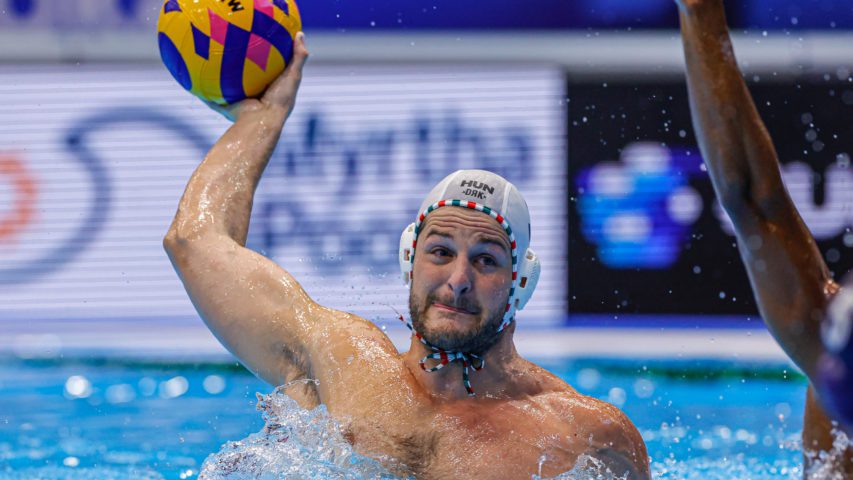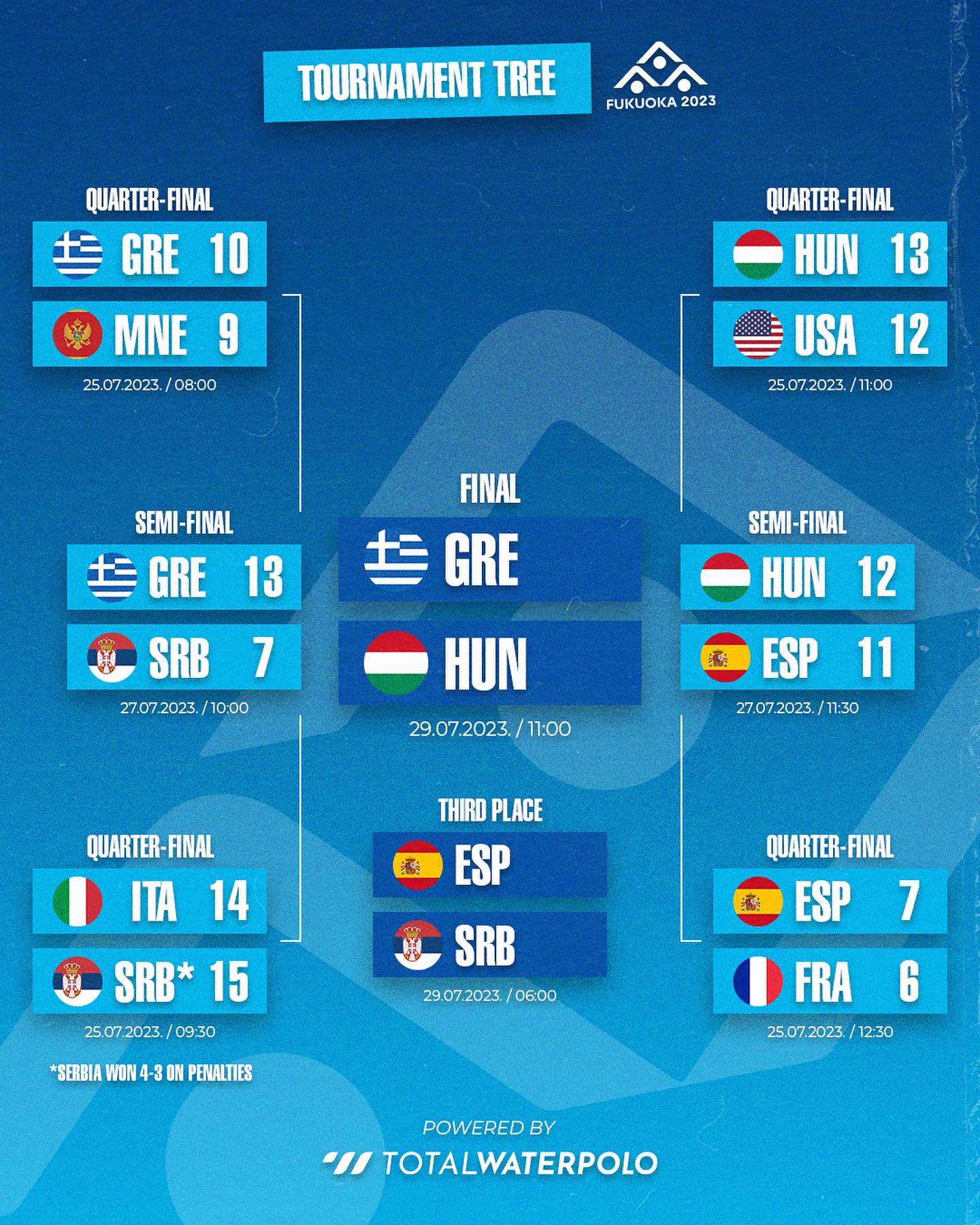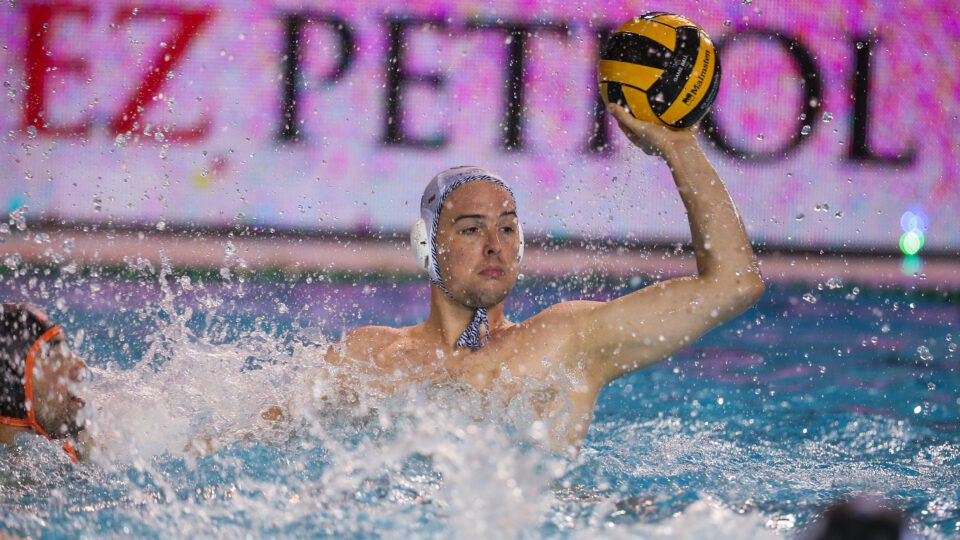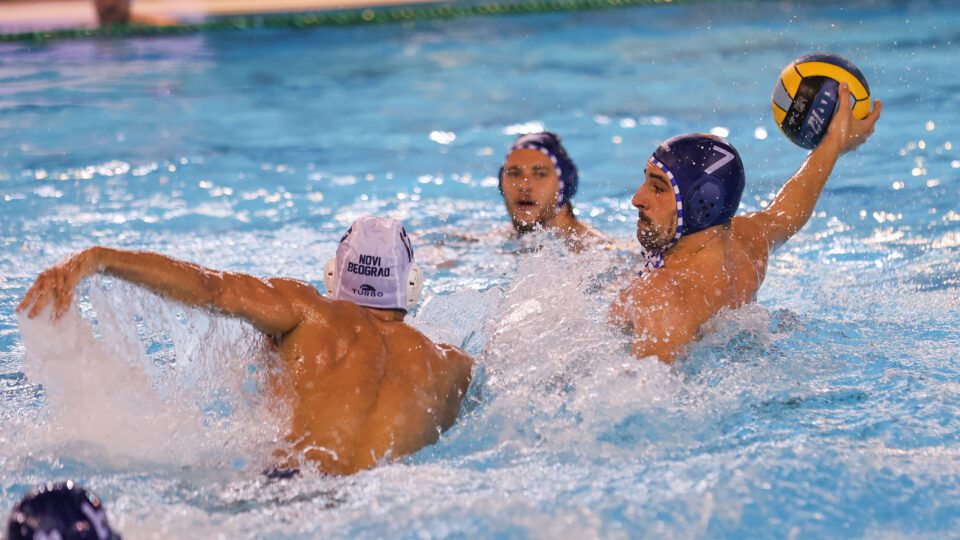Greece and Hungary will face off in the gold-medal match at the men’s tournament at the 20th World Championships in Fukuoka.
The two teams became the first to qualify for the male water polo tournament at the Paris Olympic Games.
Greece beat Serbia convincingly 13:7 in the first semifinals and will debut in the World Championships final. Hungary arrived at the final, defeating the defending champion Spain 12:11 in a breathtaking finish. Krisztian Manhercz scored a winning goal in the very last second. What made the thriller more exciting was that ball barely crossed the imaginary goal line and the goal was confirmed after a VAR check.
Italy and France will play in the 5th-place match.
Italy beat Montenegro 10:6, while France defeated the USA after a penalty shootout (18:16). The French erased a four-goal deficit in the fourth quarter to secure a penalty shootout. Thanks to the win over Team USA, France grabbed the last available berth for the World Championships in Doha. Spain and Italy secured themselves spots in Doha as the World Cup finalists. Four teams qualified from Fukuoka for the 21st World Championships. Three semifinalists earned their berths On Tuesday (Serbia, Greece, Hungary). France joined them today. The remaining teams will seek their visas for Doha at continental competitions.
Croatia beat Australia 17:10 to finish in 9th place. Host Japan defeated Canada 23:11 in the 11th-place match.
M The results, live scores, statistics from the men’s competition are available here
20th World Water Polo Championship (Fukuoka, July 17 – 29), Men, Day 6
Semifinals
Greece – Serbia 13:7 (3:2, 3:0, 3:3, 4:2)
The Greeks reached its first-ever final of the World Championships with their most convincing win over Serbia. The Greeks, who have a more experienced team than Serbia, dominated from the second quarter and outplayed the rival. Their defense did a great job. Emmanouil Zerdevas posted 11 saves. However, Serbia “helped” Greece’s defense by making mistakes in the attack and finishing some actions rashly. Greece scored five unanswered goals between the 8th and 18th minute and moved from 2:2 to 7:2, which proved crucial.
Serbia scored an opener. Jaksic scored from a counterattack, but the Greeks replied with two quick goals. Late into the first quarter, Strahinja Rasovic leveled from a penalty shot. In the next possession, Kakaris converted a man-up for 3:2, and Greece’s domination started.

Nikolaos Gkillas (GRE) and Nikola Jaksic (SRB) All photos by Orange Pictures
Serbia failed to score from its three man-up possessions in the second quarter. Greece went to 5:2 with two action goals. Fifteen seconds before the middle break, Argyropoulos converted a 6 on 5 from the deep left, stretching the margin to four (6:2).
Fountoulis opened the second half with a powerplay goal for 7:2. Shortly after, Argyropoulos found the net from 6 meters with a nice backhander, but the goal was disallowed due to an offensive foul. He committed a personal foul while returning to Greece’s half of the field, but Serbia failed to convert another man-up. Finally, after six missed chances with a powerplay advantage, Serbia converted the first in the 20th minute, and ended its 13-minute silence. Lazic made it 3:7. However, Greece didn’t let them go further. It regained a 5-goal lead twice (8:3, 9:4), but Serbia trailed by four at the last break as Jaksic scored from a 6 on 5 in the 24th minute.
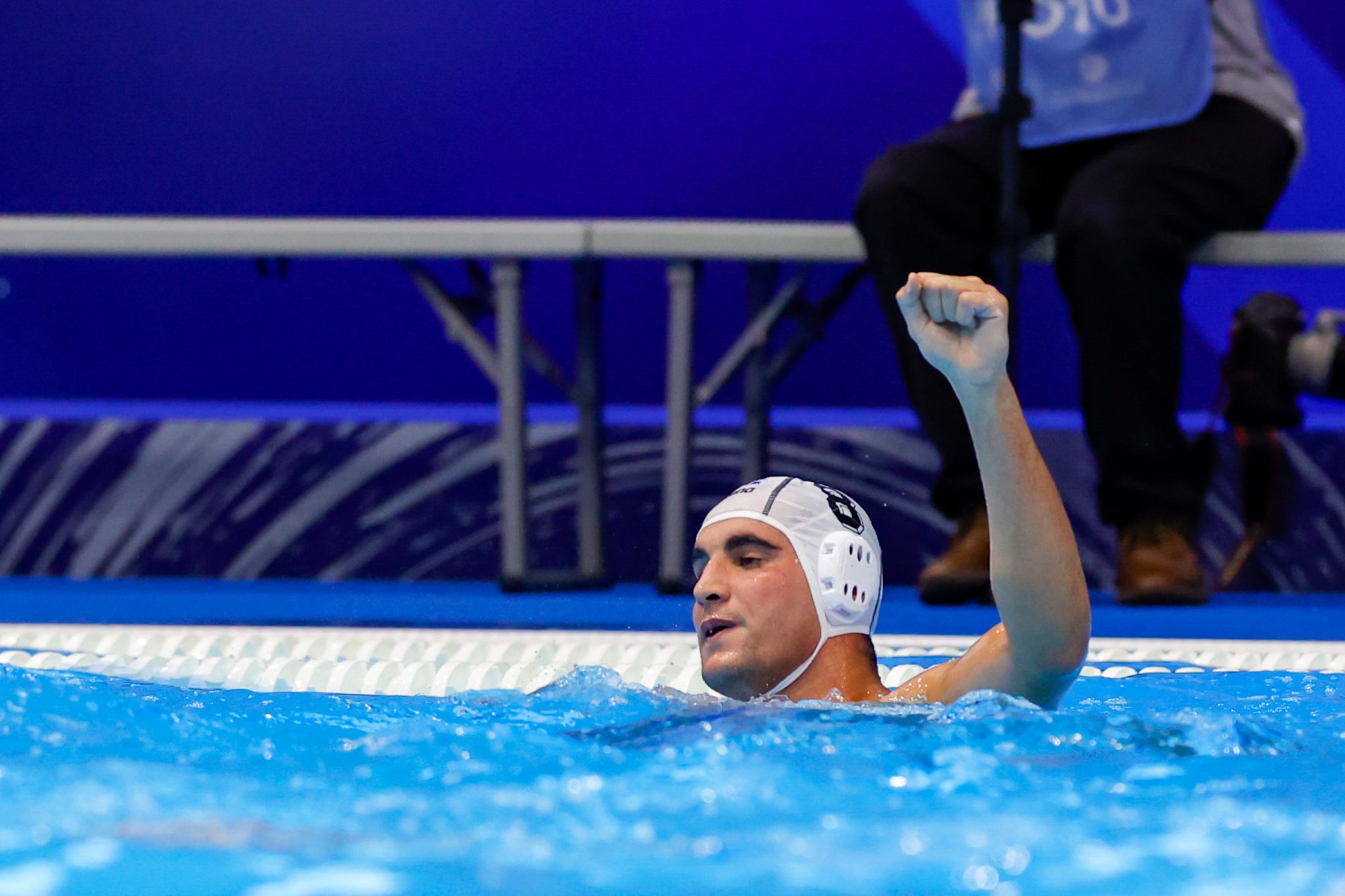
Stylianos Argyropoulos (Greece)
Serbia’s slim hope was still alive, but Greece sealed the ticket for the final in the opening minutes of the fourth quarter. Stylanos Argyropoulos scored from a distance. The goal was confirmed a minute after following a VAR review. There was no need for VAR checks after Kakaris’ goal from a center-forward position and Argyropoulos’ action goal in the 27th minute. The Greeks earned a 7-goal advantage (12:5), and the contest was over.
Many details made the difference. One of them was powerplay conversion. The Greeks committed 13 and the Serbs seven personal fouls. Greece was almost perfect in powerplay shots (6/7), while Serbia converted three from 10 attempts with an extra player and scored from the only penalty in the match. Greece’s goalkeeper Emmanouil Zerdevas blocked 11 shots, and Serbia’s goalkeepers combined four saves. The best scorers were Konstantinos Kakaris and Stylianos Argyropoulos, with three goals each.
Hungary – Spain 12:11 (3:3, 1:3, 3:2, 5:3)
Spain won’t repeat the success achieved in Fukuoka in 2001 – it won’t defend the title won at the previous championships. It will battle for bronze with Serbia. Hungary returned to the final of the World Championships after six years and will try to win its first gold after 2013.
Spain was a team that took the lead three times in the first quarter. Larumbe gave Spain a 1:0 lead with a man-up, but Alvaro Granados contributed significantly to that goal. He stole the ball in Hungary’s half of the field and pulled a counterattack forcing an exclusion. Gergo Zalanki, Hungary’s best scorer, committed his first personal foul, which was very important for Spain. Zalanki made his second one already at the beginning of the second half, so he spent more time on the bench than usual and scored two goals, which is under his average.
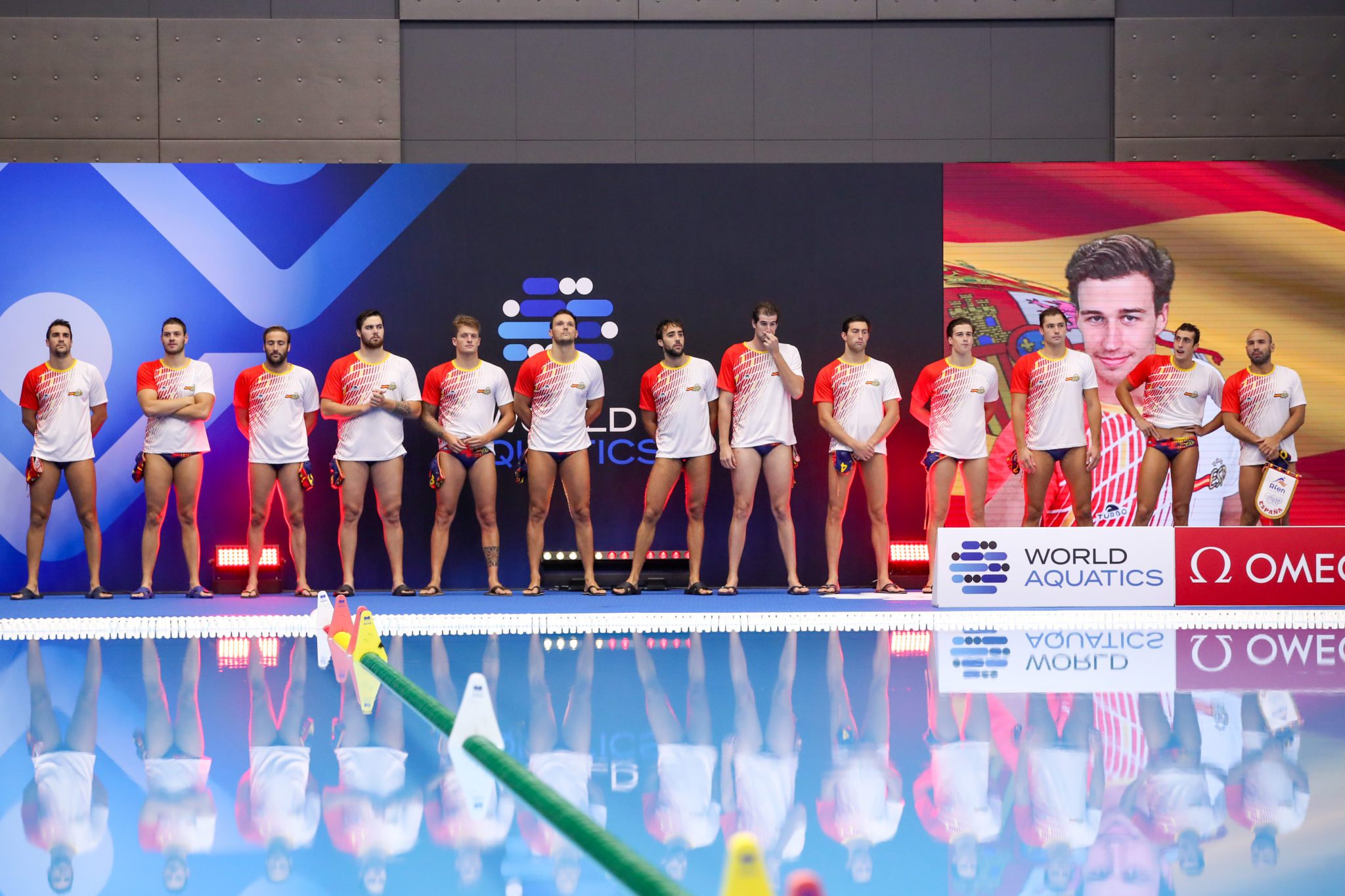
Spain
The Hungarians equalized shortly after, each of the three goals from the Spaniards in the first quarter.
In the middle of the second period, Denes Varga hit the back of the net from a backhander to give Hungary the first advantage in the match (4:3). Thirty seconds later, Hungary’s goalkeeper Soma Vogel saved a penalty shot from Felipe Perrone. It seemed that Hungary had started taking control. But, Spain scored three straight goals in the last two and a half minutes in the first half. Munarriz leveled from a distance shot from the left. Perrone made up for the missed penalty by scoring from almost the same position as Munarriz. Perrone made it 6:4 with 39 seconds left on the clock, again from a long-distance shot, but this time the Spanish veteran did it from the right side.
Sanahuja widened the gap in Spain’s first possession in the second half – 7:4. Hungary tried to come back, and cut the deficit to one three times (6:7, 7:8), but it couldn’t equalize. De Toro buried a 6 on 5 to end Spain’s nice action for 9:7. In the following minutes, the teams traded the goals. Three minutes before the end, Spain had a 2-goal lead. But, after leftie Blai Mallarach sent the ball into the net for 11:9, which happened at 03:12, Spain couldn’t score, while Hungary did it three times.
Jansik scored for 10:11 immediately after. Marton Vamos equalized at 11:11 with a “bomb” from eight meters with 01:55 minutes to go. Both teams lost balls in their next possessions. Spain earned a man-up at 00:35. Gergo Zalanki committed his third personal foul, so Hungary would not have counted on its best scorer if the match had gone to a penalty shootout.
Hungary defended with a man-down – Bernat Sanahuja missed. Sixteen seconds were left on the clock. Hungary’s head coach Zsolt Varga called a time-out.

Hungary
In the dying seconds, Denes Varga assisted Krisztian Manhercz, who escaped Spain’s defense and shot from the deep left. The ball passed under goalkeeper Unai Aguirre’s arm, the buzzer sounded, and everybody waited for the referee’s decision. After a VAR review, the goal was allowed – it was scored before the buzzer, the ball barely crossed the goal line, and Hungary went to the final.
There were 16 different scorers in the match (eight in each team). The hero of the match Krisztian Manhercz hit the back of the net three times. Jansik and Zalanki contributed to the win with two goals each. Three players of Spain scored twice: Perrone, Munarriz and Sanahuja. The goalkeepers had similar outputs. Soma Vogel blocked six and Unai Aguirre seven saves.Hungary scored four powerplay goals (4/9) and Spain three (3/7).
5th-8th place classification, semifinals
Montenegro – Italy 6:10 (1:1, 1:3, 2:3, 2:3)
Montenegro didn’t surprise Italy even though it started better. Both teams had good defense, but Italy’s goalkeeper Marco Del Lungo, who made 13 saves, proved to be the key difference.
The Montenegrins led 1:0 at the start and 2:1 in the 11th minute. But, then the “Settebello” kept Montenegro goalless for nine minutes, scoring five goals in that period. In the 20th minute, Francesco Di Fulvio scored from a 6 on 5 to give his team a 6:2 lead. Djuro Radovic ended Montenegro’s drought with a double man-up. Shortly after, Ukropina had an opportunity from a penalty shot. Del Lungo saved his shot, but Montenegro’s leftie took the ball 15 seconds later and netted an action goal. Montenegro cut the deficit to two (4:6).

Edoardo di Somma (ITA) blocks Vasilije Radovic (MNE) Photo by Albert ten Hove/Orange Pictures)
Italy restored a four-goal lead. Luca Damonte made it 8:4 from a long-distance shot in the Italians’ first possession in the fourth quarter. The Italians maintained the difference in the remaining time. Montenegro narrowed the gap to three twice, but Italy responded on both occasions and recorded a four-goal win.
Leftie Luca Damonte scored three goals for Italy. Montenegro’s Miroslav Perkovic also netted three. Italy’s goalkeeper Marco Del Lungo posted 13 saves, five more than Petar Tesanovic.
USA – France 16:18 (3:1, 3:3, 5:4, 2:5, PSO 3:5)
After Italy beat Montenegro, the match USA – France became the most crucial match in the 5th-8th place classification because it was clear that the winner of this game would qualify for the Doha Championships.
The Americans led for most of the game. They didn’t dictate the pace throughout the game. France had periods of very good play. However, Team USA controlled the result because of many converted penalty shots and two 3:0 runs in the middle two quarters. Still, France prolonged a match in a shootout thanks to a late comeback and an incredible equalizer by Thomas Vernoux with four seconds to go.
Team USA, playing without Ben Hallock, who was excluded in the quarterfinals, earned a 2:0 and 3:1 lead in the first quarter. Early in the fourth quarter, Marzouki leveled at 3:3. However, the Americans responded with three straight goals (two with an extra player – Ryderr Dodd and Johny Hooper and one from a penalty – Vavic) and earned a 3-goal lead for the first time (6:3).
Alex Bowen, who was on fire today, scored for 7:4 in the 18th minute. France’s leftie Duje Zivkovic netted two goals from almost the same place (one action and one powerplay goal), and the Europeans came very close (6:7). Between these two goals, France’s goalkeeper Hugo Fontani, who has had an excellent tournament, saved a penalty shot from Daube. But, the Americans held back France’s comeback attempt, producing a 3:0 run within 02:21 minutes. Bowen converted a penalty. Hooper sent the ball into the net from the top. The same player made it 10:6 from a counterattack.
The USA kept a 4-goal difference until 13:9. In the 27th minute, Irving made it 13:9 from a penalty, but the Americans didn’t find the net in the last five and a half minutes.
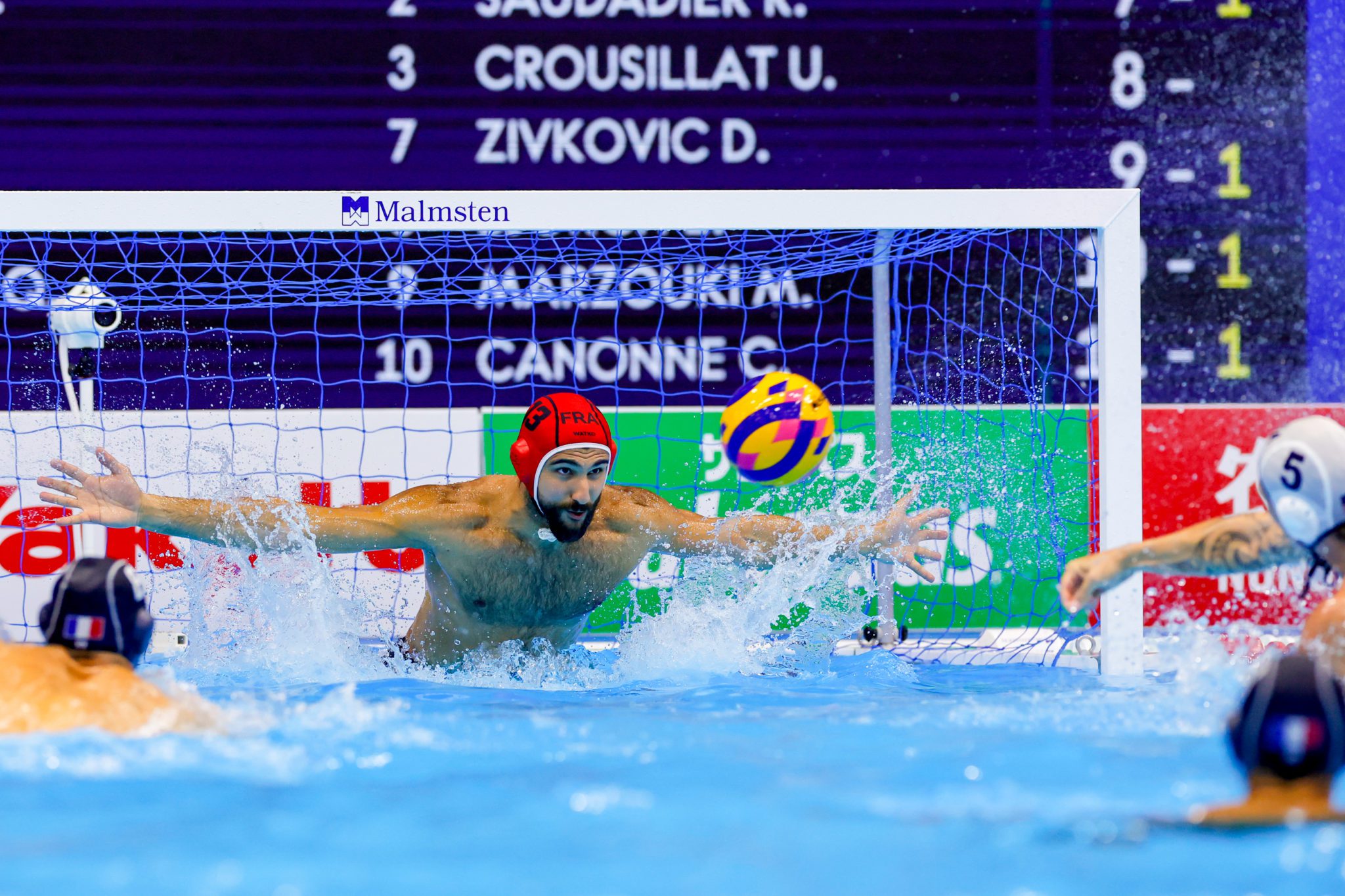
Hugo Fontani saves a shot from Hannes Daube Photo by Albert ten Hove/Orange Pictures
By the middle of the quarter, France narrowed the distance to two (11:13). Thee and a half minutes before the end, Daube failed to convert a penalty once more (he missed this time), and France continued returning. Thomas Vernoux, who didn’t score a single goal in the first three periods, found the net for 12:13 with an extra player and a thrilling finish started. The Americans had a man-up in their next possession, but they lost the ball (Bouet stole it), and France got a chance to level the score. Still, they failed – Mehdi Marzouki’s shot went wide. Only 27 seconds were remaining on the clock. The USA had to keep the ball until the end and save a win. The water started boiling. At 00:17, Daube (USA) and Bjorch (France) were excluded and France’s head coach Florian Bruzzo was red-carded. The Americans still had everything in their own hands. But, five seconds from the end, Luca Cupido committed an ordinary foul on Vernoux, who grabbed the ball immediately and hit the back of the net from a difficult position. Vernoux was near the pool’s edge and ten meters far from the USA’s goal, but Weinberg, who was a few meters ahead of his goal, couldn’t stop the French’s rocket – 13:13.
France made no mistakes in the penalty shotoout. All five players found the net. Hugo Fontani saved a shot from Irving in the 2nd round, which was enough for France’s victory.
I Regardless of the result of the match against Italy, France achieved its biggest success in the World Championships. Their highest finish before Fukuoka was 8th place in 1986.
France’s best scorers were Ugo Corusillat and Thomas Vernoux, with three goals in regular time and one in a penalty shootout. Alex Bowen scored six (5+1) and Johnny Hooper four (3 +1) for the USA. France’s goalie Hugo Fontani posted 11, and Adrian Weinberg seven saves
Both teams went on 4/9 in the extra player shots. USA had six penalty shots in the regular time and scored four goals. France converted both of its chances from the 5m line.
9th-place match
Croatia – Australia 17:10 (3:2, 5:4, 6:2, 3:2)
The European champion didn’t come to Japan to play for 9th place at the end of the tournament. Still, the Croats found enough motivation to finish the Championships with a win.
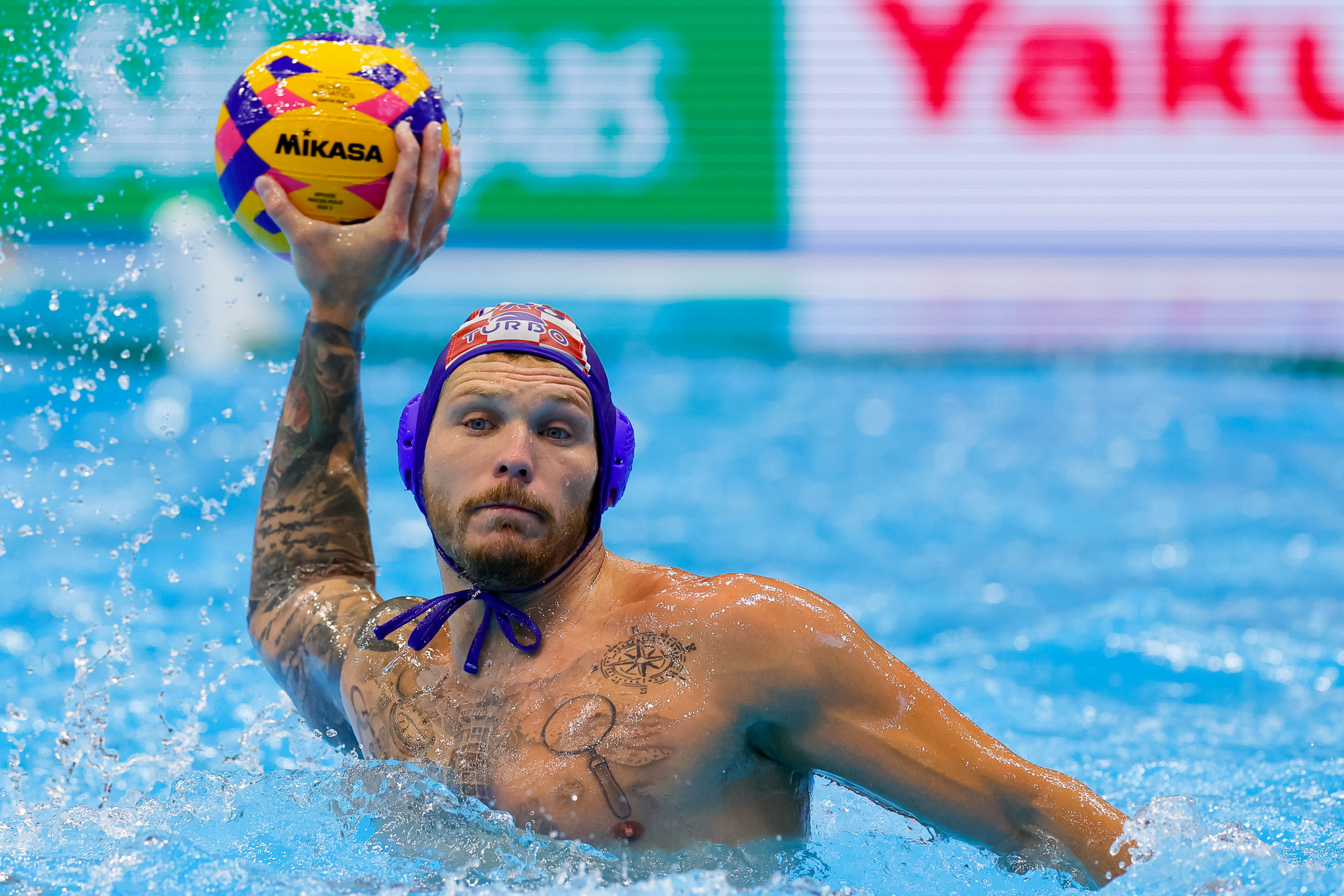
Jerko Marinic Kragic (CRO)
The Australians kept up with Croatia in the first quarter and a half, primarily because they made almost the most of their man-up chances. In the 12th minute, the score was 4:4 (Australia scored each of its first four goals from 6 on 5s). In the 16th minute, Croatia earned a 3-goal lead for the first time (8:5). Pavillard converted a man-up for 6:8 after that, and Australia was still in the game. At the beginning of the second half, the teams exchanged goals until 10:8. Then Croatia produced a 4:0 run and built a safe 14:8 lead.
Croatia was 4th in Budapest last year, while Australia climbed a step higher after 11th place at the 2022 Worlds.
Ante Vukicevic was the best scorer with five goals. Luka Bukic followed him with four. Chaz Poot scored three for Australia, which had a very good percentage of extra player shots (7/8). Croatia scored five powerplay goals from nine attempts. Croatia’s goalkeepers combined nine saves, Australia’s only two.
11th-place match
Canada – Japan 11:23 (3:6, 3:6, 2:8, 3:3)
Unlike their previous matches, Japan wasn‘t a team that opened the game better and imposed its rhythm from the first whistle. Canada took a 2:0 and 3:1 lead. However, Japan gained a three-goal lead with five goals in the last three minutes of the first quarter (6:3).
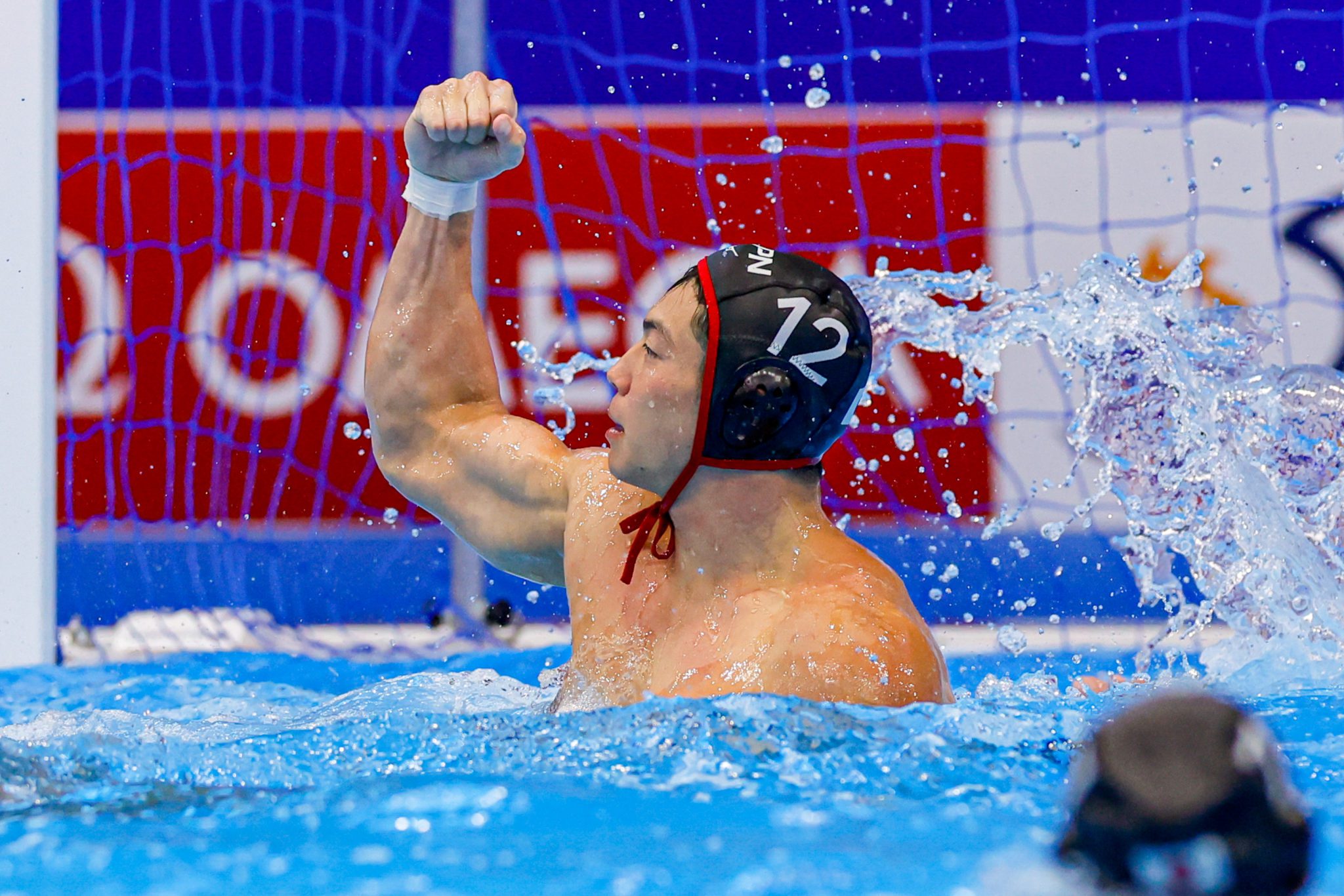
Canada’s Cote opened the second period with an action goal for 4:6. But, Japan took control then. The North Americans had no response to the hosts’ counterattacks and aggressive defense. By the middle of the second quarter Japan earned a 7-goal lead (12:5). At halftime, Canada trailed by six goals (6:12). Japan secured a win in the following eight minutes. Almost each of the home team’s scoring attempts in the third period was a goal, so the Japanese doubled their advantage before the final quarter (20:8) and maintained the difference until the end.
Yusuke Inaba netted six goals for Japan (from seven attempts), Taiyo Watanabe found the net four times. Bogdan Djerkovic was the best scorer in Canada with three goals. Japan scored five goals from counterattacks, four from penalty shots and had a 5/9 powerplay shots efficiency. Canada had seven man-up attacks and scored three goals.
Japan was 9th in Budapest last year ,when Canada had a lot of bad luck and was excluded from the tournament because a number of Covid cases at the team.
9. Croatia
10. Australia
11. Japan
12. Canada
13. Argentina
14. Kazakhstan
15. China
16. South Africa
For more news and the schedule of the Worlds in Fukuoka, visit Total Waterpolo’s 2023 World Championships page.
More articles about the World Championships
Follow us on Facebook, Twitter and Instagram. For more video content, subscribe to our Youtube Channel and Tik Tok account



